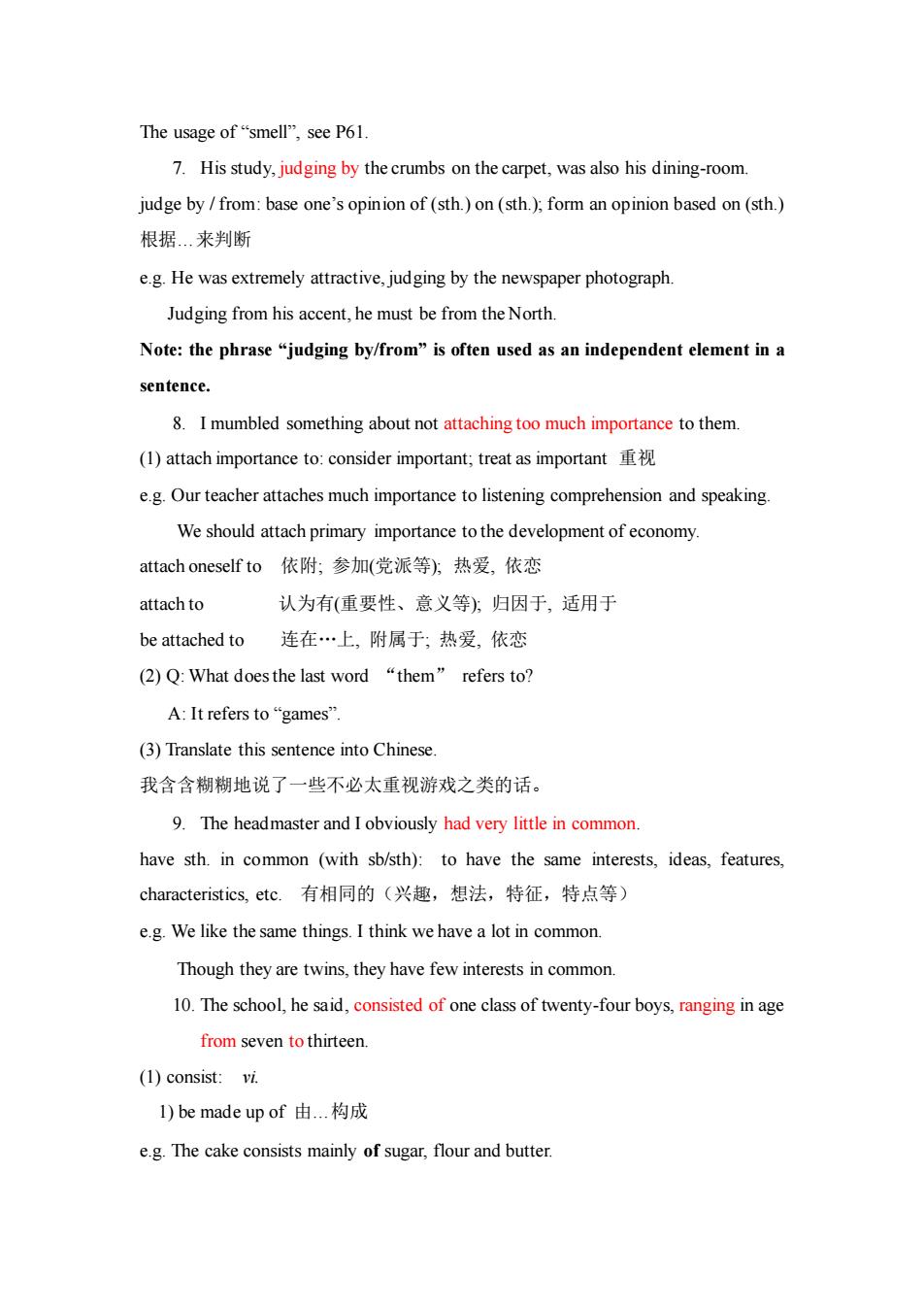正在加载图片...

The usage of"smell",see P61. 7.His study,judging by the crumbs on the carpet,was also his dining-room. judge by/from:base one's opinion of(sth.)on(sth.),form an opinion based on(sth.) 根据…来判断 e.g.He was extremely attractive,judging by the newspaper photograph. Judging from his accent,he must be from the North. Note:the phrase "judging by/from"is often used as an independent element in a sentence. 8.I mumbled something about not attaching too much importance to them. (1)attach importance to:consider important:treat as important e.g.Our teacher attaches much importance to listening comprehension and speaking. We should attach primary importance to the development of economy. attach oneself to依附;参加(党派等),热爱,依恋 attach to 认为有(重要性、意义等,归因于,适用于 be attached to连在…上,附属于,热爱,依恋 (2)Q:What does the last word“them”refers to2 A:It refers to“games” (3)Translate this sentence into Chinese. 我含含糊糊地说了一些不必太重视游戏之类的话。 9.The headmaster and Iobviously had very little in common. have sth.in common (with sb/sth):to have the same interests,ideas,features characteristics,.etc,有相同的(兴趣,想法,特征,特点等) e.g.We like the same things.I think we have a lot in common. Though they are twins,they have few interests in common 10.The school,he said,consisted of one class of twenty-four boys,ranging in age from seven to thirteen. (1)consist:vi. I)be made up of由..构成 e.g.The cake consists mainly of sugar,flour and butter.The usage of “smell”, see P61. 7. His study, judging by the crumbs on the carpet, was also his dining-room. judge by / from: base one’s opinion of (sth.) on (sth.); form an opinion based on (sth.) 根据…来判断 e.g. He was extremely attractive, judging by the newspaper photograph. Judging from his accent, he must be from the North. Note: the phrase “judging by/from” is often used as an independent element in a sentence. 8. I mumbled something about not attaching too much importance to them. (1) attach importance to: consider important; treat as important 重视 e.g. Our teacher attaches much importance to listening comprehension and speaking. We should attach primary importance to the development of economy. attach oneself to 依附; 参加(党派等); 热爱, 依恋 attach to 认为有(重要性、意义等); 归因于, 适用于 be attached to 连在…上, 附属于; 热爱, 依恋 (2) Q: What does the last word “them” refers to? A: It refers to “games”. (3) Translate this sentence into Chinese. 我含含糊糊地说了一些不必太重视游戏之类的话。 9. The headmaster and I obviously had very little in common. have sth. in common (with sb/sth): to have the same interests, ideas, features, characteristics, etc. 有相同的(兴趣,想法,特征,特点等) e.g. We like the same things. I think we have a lot in common. Though they are twins, they have few interests in common. 10. The school, he said, consisted of one class of twenty-four boys, ranging in age from seven to thirteen. (1) consist: vi. 1) be made up of 由…构成 e.g. The cake consists mainly of sugar, flour and butter